
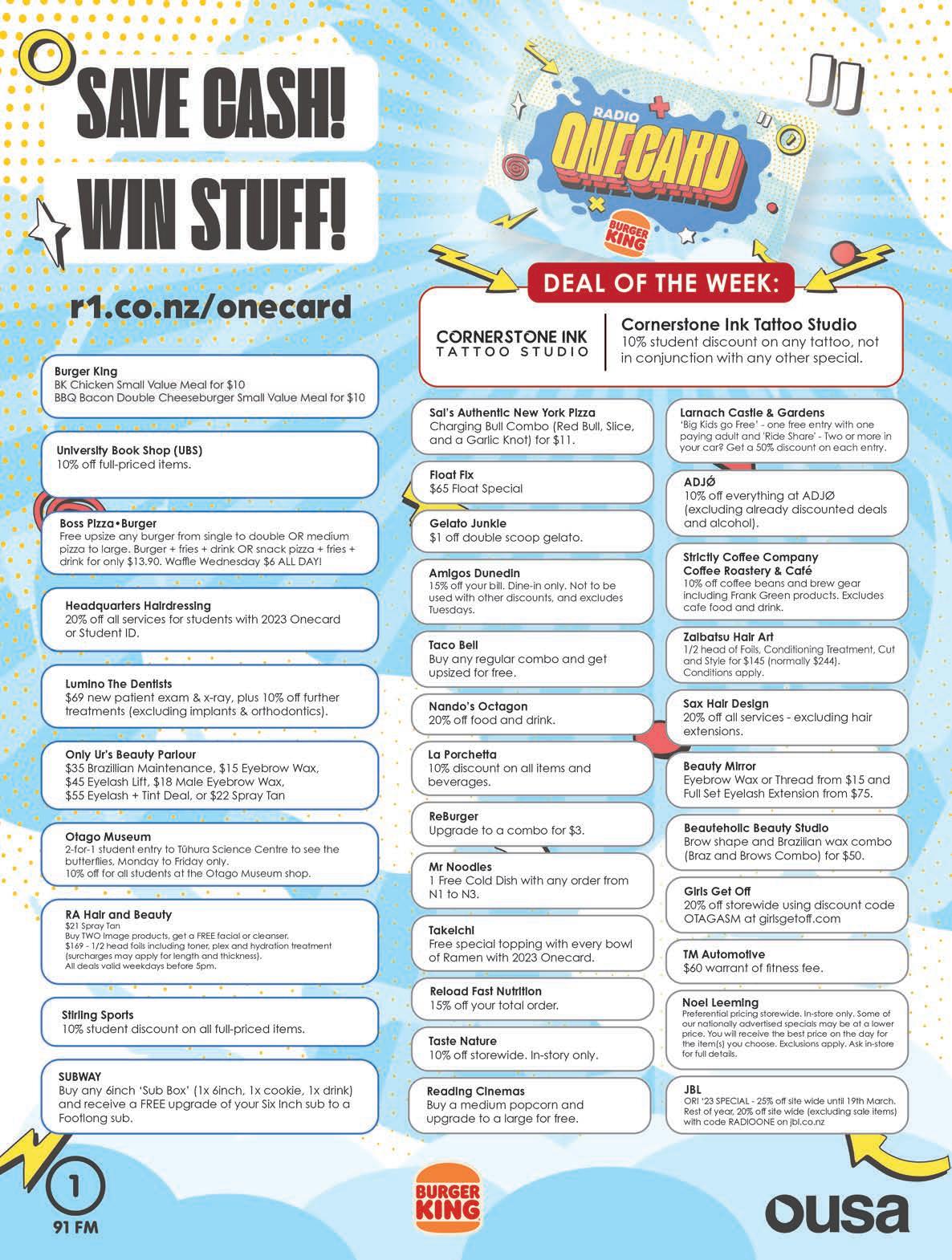
Rod Stewart w/ Cyndi Lauper and Jon Stevens
FORSYTH BARR STADIUM
5PM

Tickets from ticketmaster.co.nz.
Tomahawk Radio - 'Missiles' Single Release THE CROWN HOTEL 8PM / $5
Mālo e lelei, Halo olaketa, Kia orana, Fakaalofa atu, Ni sa bula vinaka, Talofa and warm Pacific greetings!

My name is Elisepa Taukolo and I am the President of UOPISA.
If you see me and my team around, come and say hello! Feel free to contact us via email:
uopisa.president@gmail.com

uopisaotago@gmail.com

'Ofa atu!
Out of Luck w/ Splinter and Ghost Colored Faces
DOG WITH TWO TAILS
8PM
Tickets from undertheradar.co.nz
For more gigs happening around Dunedin, check out r1.co.nz/gig-guide






3
06 APRIL
08
WEDNESDAY 05 APRIL THURSDAY
SATURDAY
APRIL
LETTERS
EMAIL CRITIC@CRITIC.CO.NZ

LETTER OF THE WEEK
Hey Critic,
LETTER OF THE WEEK WINS A $25 VOUCHER FROM UNIVERSITY BOOKSHOP

Actually fuck the ODT, why the hell was the byline for their piece about the castle street cleanup some horseshit about "students stop partying for a day to go clean up castle street". What a way to undermine the efforts of students, and the intention behind the charter. To do that, and then put the actual article behind a paywall is fucked.
Hi,
Academic freedom and freedom of speech are important, but academics have a responsibility to be diligent in who they platform. For example, a professor in the politics program regularly goes on a station that also platforms some pretty awful people. This came to a head on the morning of Thursday 30 March, where the host interviewed Posie Parker (where they expressed some pretty transphobic views) and then interviewed the politics professor about something unrelated. I understand being the critic and conscience of society, but when professors give these trashy news programs legitimacy it hurts both higher learning and civil society.
J Dear Critic
I have a question for any physics nerds: how many electrons can you fit on a bus lol G
Kia ora!!
I am currently at the Highlanders game and our students are doing a disservice to the team and the ZOO! We have people sitting down and providing little support to our players.
I would like you to include in the next available Critic a reiteration of the rules of the zoo.
Namely:
1. No sitting in the zoo. (It is criminal that this unspoken rule has not been spread throughout the fresher cohort).
2. You must come with a very substantial buzz to the game.
The Highlanders need all the support they can get. Especially at their home ground!! Please can you pass on this information to the fellow students and freshers of Dunedin.
Thank you for your time, Leo S
Kia ora Critic,
Come see the Free Fares table in Link from 11 to 2 on Wednesday! We’re asking for free public transport for tertiary students, total mobility card holders, community services card holders and under 25s. We're also asking for the government to keep the current half price fares too. Come by to send a postcard to Transport Minister Wood and get a chocolate! For climate, for people, and for community. And also for free chocolate
Free Fares NZ
Kia ora Critic,
As an aspiring musician greatly in need of open mics for developing my skills, I gotta say I’m pretty devastated at the trend here in Dunedin. That’s why I’m gonna plug my local - Inch Bar just opposite New World Gardens - as an amazingly supportive spot that welcomes all sorts of musos. Their Tuesday open mics are free to anyone who wants to get up on stage - and the vibe is phenomenal too! Come along and check it out sometime.
Sincerely yours, Anonymous strum-strummer
DISTRIBUTION
Vincent Withers
ADVERTISING SALES
Laura Maxwell
Esmond Paterson
Simpson
VIDEO EDITOR
Sophie Douglas
VIDEOGRAPHY
Hugh Askerud, Isaac Chadwick
CENTREFOLD Daniel Van Lith
FRONT COVER
Molly Willis
ONLINE
Arlo Hill
Anna Casey sales@planetmedia.co.nz
03 479 5361
READ ONLINE critic.co.nz
Issuu.com/critic_te_arohi
GET IN TOUCH critic@critic.co.nz
Facebook/CriticTeArohi
Tweet/CriticTeArohi 03 479 5335
P.O.Box 1436, Dunedin
Critic Te Ārohi is a member of the Aotearoa Student Press Association (ASPA).
Disclaimer: the views presented within this publication do not necessarily represent the views of the Editor or OUSA.
NZ Media Council: People with a complaint against a magazine should first complain in writing to the Editor and then, if not satisfied with the response, complain to the NZ Media Council.
Complaints should be addressed to the Secretary: info@mediacouncil.org. nz.
4
M
ISSUE 06 03 APRIL 2023 EDITOR Fox Meyer SUB-EDITOR Nina Brown NEWS EDITOR Nina Brown FEATURES EDITOR Elliot Weir CULTURE EDITOR Annabelle Parata Vaughan KAITUHI MĀORI Skyla, Ngāti Hine STAFF WRITERS Lotto Ramsay, Jamiema Lorimer, Zak Rudin,
Hehir
Iris
FOOD:
@chargrillss
DESIGNER Molly
SUB-DESIGNER Evie Noad ILLUSTRATION Mikey Clayton @itsspikeymikey Daniel Van Lith @art_by_deeev Justina King @coccinelleart
Connor Simpson @simpson.photography
Connor
VOLUNTEER REPORTER: Rauri Warren, Emily Esplin COLUMNISTS
Charley Burnett
BOOZE REVIEWS: Dan Muir
Willis
PHOTOGRAPHER
VIDEO TEAM LEAD
EDITORIAL :
OCEAN’S ELEVEN BAR AND CLUB
BY FOX MEYER
Avid readers will remember the year’s first issue, in which we talked about how Eleven Bar couldn't be bothered with boring legal stuff like fire or food safety (yawn) and breached the Sale and Supply of Liquor Act from nineteen-ninety-whatever. Cracking stuff, right? Well, no, we know it’s pretty boring.
That article was written under a lot of pressure not to cock up Eleven’s liquor licence renewal hearing, which was (and is) active. We didn’t want to cause a mistrial, so we finally got around to sourcing our own witnesses like proper journalists, and now we’ve got something proper to share with you. In the spirit of fairness and accuracy, we reached out to the establishment for their response on all of these accusations, but they said they didn’t want to comment until after the hearing. Fair enough, but none of this stuff is information that came from anyone involved in the hearing anyway.
So this page is just my opinion about the whole situation, which is, to put it lightly, a bit of a fucking problem. I’ll start with my favourite bit of the saga, though, because it’s the least problematic: at some point a year or so ago someone made a fake Eleven Bar Instagram account and started posting things like “Come in and see our staff for a free kg of raw bacon!” and “Nothing’s as good as a hit from the needle. We’re hiring!” It went on for ages.
It only goes downhill from there. On the next pages you’ll see a collection of individual stories. On their own, each story isn’t
all that bad; oh, they’re serving double-doubles? Sick, fuck the rules, good on ‘em. Oh, the owners are drinking on the job? Yeah, okay, that’s not great but hang loose I guess. Oh, they’re not able to pay their staff on time? Hmmm, okay. Oh, their security guys are creeping on staff members? Yeah, alright, I’m seeing a pattern here. This reeks of negligence. I wonder what I haven’t heard about.
But honestly, from what I have heard, it’s an impressive failure of an establishment that’s missed the mark on every single conceivable measure: payroll, oversight, security, basic regulations, everything. Everything but packing a crowd, which has never been a problem. And now they might not get their licence renewed, which would be so embarrassing, really. Like, guys, you own a bar in Dunedin! You’ll never have a better customer base, and you still managed to run it this far into the ground? What an achievement. I couldn’t have done a worse job if I tried.
Or maybe they’re successful, and our city grants them the right to keep it up. And what would that mean? Personally I reckon these problems have been here from the start, and they’re only promising to change now because they’re in court. You really think they’re gonna do better if you give them a second, third, fourth chance? Get real. The risk factor is already at a 10 and, like anyone with half a brain, this scale doesn’t go to 11.

New Details: Eleven Bar “Super Crook”, Report Staff Allegations of management drinking on the job, failing to pay wages
A former staff member said their time at Eleven Bar was “unlike any hospo job I’ve ever seen”. Reports from two ex-staff describe management drinking on the job, little to no oversight of employees and a security team that did little to control any of the resulting problems.
Eleven Bar’s owners started out with, by all accounts, a competent manager. Before a dispute caused him to leave, ex-staff members told us that this manager actually had to ban one of the bar’s owners from his own bar for inviting underage patrons onto the premises in late 2021.

According to two employees that worked during the 2021 summer, Henry* and James*, this same manager had to pay Eleven’s employees cash out of pocket because, in their words, “the payroll system was so fucked” that they wouldn’t have been paid otherwise. Shortly after this, the manager left Eleven. So, down a manager, with an owner trespassed from his own venue and in a financial squeeze, bar management was taken over by the owners: Naveen Malhotra, Nikesh Singh, and Prakaash Khattri. They are currently in the hearing process to have their liquor licence renewed (which is being opposed by city officials, police, and Students for Sensible Drug Policy), and as such, chose not to respond to any of the claims made in this article. If they respond after the publication of this piece, we will modify the online version accordingly.
During prior hearing proceedings, owners promised to make big changes to the problems raised before them in the meeting. But according to staff we spoke to – none of whom are involved in the hearing process – these problems were visible over a year ago.
“There was always that joke of, like, this place is literally not gonna exist in six months,” said Henry. James agreed, describing the entire ownership body as if “they found all the worst people in Dunedin and put them in one bar.” Henry said that “Naveen or Nikesh would drink while acting as duty manager.”
Specifically, he said they liked Chivas 18 whiskey, which retails for $89.99 a bottle. This was during a time where employees said they had to wash linens by hand because the washing company hadn’t been paid and was refusing service.
“They had a bottle there that they called the ‘Duty Manager's bottle’, and it was one that we wouldn't give out to customers and they would just drink it while they were at work as duty manager.” When they weren’t on the clock, Henry said they were still frequent patrons. “There was no accountability. There was no ‘do this’. It was just like, ‘Bring the alcohol every 15 minutes for me and my friends’... It kind of felt like you were kids left alone with no supervision when you were working there.”
By Ruari Warren & Fox Meyer Staff Writer // Editor
“It was kind of in agreement within the staff that it was known that these owners were shady,” said Henry - but he never reported anything he saw. “For me as a bartender who had just started there, it was fun just making up shots and doing whatever…Like, obviously they're breaking liquor licensing rules but for me, since it was just a summer job, it didn't really matter.”
James seconded all of Henry’s claims of liquor licensing breaches. James saw something called a “double-double” shot being poured, which is exactly what it sounds like and is definitely not legal. “I never personally [was asked to make] one, but I remember [management] doing it,” he said. And while he certainly saw owners bringing in their mates, James never saw anyone underage, or even borderline, as
6
KARERE 06 NEWS
“There was always that joke of like, this place is literally not gonna exist in six months.”
others had claimed. “The main problem that I saw was the overstepping of just pouring drinks for themselves and doing that and that type of thing,” he said. But “it never felt like something to report because it was just like, ‘Oh, the owners are in and they're drinking’.”
But claims of underage patrons in the bar were not unheard of. Though neither Henry nor James had seen it personally, both said they’d heard about it happening while they worked there. James was adamant that it had happened, but Henry wasn’t so quick to assume. “I wouldn’t be surprised, though,” he said. Either way, Henry said he was glad to see the bar being held accountable for their actions. James agreed: “Serves them right for doing all this. But I wish that nobody would've gotten hurt in the process.”
Henry and James both left in early 2022. From this point on, most of the complaints we heard from patrons and staff revolved around security. These people don’t actually work directly for Eleven, but are contracted through a separate company. Theoretically this means they are a third-party entity who ought to control the environment, but this doesn’t seem to have been the case. At least one security guard, mentioned in stories by all three staff we spoke to, does not currently have an active Certificate of Approval for work as a security guard. According to public record, they had their CoA application declined, which means that the Private Security Personnel Licensing Authority found them unsuitable for the role.
A young woman who worked at the bar a year ago showed us Facebook messages from what appeared to be this guard asking for cuddles after work. “It definitely did not make me feel like this was a professional, safe environment,” said the staff member. “In fact, it felt crook as fuck.” This incident wasn’t reported to management, and it appears that this guard no longer works at Eleven Bar. “It was just part of this bigger culture of ‘no one at this bar gives a fuck about you’, you know? If that’s the kind of security they’re hiring, why would I even bother reporting it?”
And now we get to 2023. OUSA President Quintin Jane said that “Eleven should have had their licence removed a long time ago… I hope a more responsible licensed venue can take its place.” He went on to describe the allegations made about the bar’s atmosphere as “disgusting… actively contributing to alcohol-related harm, rather than helping to curb it as a licenced venue."
Eleven Bar is currently in the process of trying to get their liquor licence renewed. The bar remains one of the most popular in the Octagon. It advertises cheap drinks and is known amongst the younger student crowd for its loose atmosphere. Its queue is often the longest in town. When asked if their establishment was a safe space for students, management gave no answer.

7
KARERE 06 NEWS
“Serves them right for doing all this. But I wish that nobody would've gotten hurt in the process.”
2023 Castle Clean-up Sees a “Whole New Generation” of Volunteers
200 students swapped bevvies for brooms at the annual clean up

 By Anna Robertshawe Staff Writer
By Anna Robertshawe Staff Writer
KARERE 06 NEWS
"It’s a reminder of our community, and to look after each other and the place we live."
Organisers were “really happy” with the turnout this year, speaking to the potential of the Dunedin student community to make positive change.
Last Friday, around 200 students congregated under the Dunedin sun to participate in a community clean-up of Castle St. Led by the student-led group Hold Onto Your Friends (HOTYF), the clean-up is aligned with the Sophia Charter, dedicated to Sophia Crestani. The clean-up is part of a wider initiative to improve the safety and cleanliness standards of Dunedin culture, and raise awareness to the importance of looking after each other and the place we live. Hannah was a friend of Sophia’s, and is passionate about spreading this message: “It’s about looking out for people’s well-being, which means taking care of yourself, your mates, and your environment”.
HOYTF is a student-led initiative, which “stemmed from a group of alumni students that knew [Sophia],” says Hannah. “The purpose of it is to be able to maintain the legacy for the Sophia Charter.” However, it also extends wider than that. Bede is a fourth-year student, whose sister was a good friend of Sophia’s. “Our ethos is rooted in personal connections. It’s about making sure we’re not losing any mates”.
This year is “probably one of the greatest” for HOTYF, says Hannah. “Because it’s not just a group who had a connection” to Sophia. There’s a “whole new generation of students coming through” who have no idea what happened. Things like this serve as “a good reminder” of what’s important. According to Bede, HOYTF promotes a “sustainable but still fun” student culture, focused on “making it long-lasting”.
The group prides itself on its student voice. “It’s definitely a bottom-up approach,” says Niamh, a member of HOYTF. “It’s something autonomous coming from us, the students.” She says that while the University has been “super helpful”, sometimes it’s good to hear things coming from students. “It’s more effective and students are more receptive to it.” The group is “focused on bridging the gap between students and the Uni” on these sorts of issues.
The clean-up is a good example of taking small steps to create big change. “One small thing you can do to make a difference is cleaning up where you live. It’s a big sign of respect”, says Hannah. Oli, a member of HOYTF, acknowledges that “it’s obviously not going to fix the entire problem, but it’s a start.” She encourages students to recognise the change that is possible with only a bit of effort. “No one wants to live in a shithole. People accept that Castle St is a shithole where you can’t go barefoot because of all the glass.”
The current and ex-residents of Castle St who participated recognise this image that is portrayed of their home, motivating them to get involved in the initiative. “I lived on Castle St last year, and I know we’ve all had experiences of scary stuff. It’s a reminder of our community, and to look after each other and the place we live,” says Ana, an ex-8 man resident. “Being a second year last year, I saw the real effects of living on Castle St. The bottle throwing, glass and rubbish everywhere, people getting injured,” says Niamh. It’s a chance for residents to refute the image of Castle being a “shithole”, and take pride in the place they live. “We’re lucky to live in such a beautiful city. We need to keep it that way,” says Ana.
North Dunedin prides itself on its sense of student community, and the turnout of students speaks to this. “I’ve never seen this before,” says Rob, a member of Campus Watch. “There’s a good turn-out of first-timers.” The clean-up enhances this community feel, with “the idea of all working together in a shared space to create change,” says Hannah. “It’s bitter-sweet. But at the end of the day, we’re all here for the sense of community”, says Elspeth, a third-year student who came out to participate.

The impact of the day spans far wider than just Dunedin students. During the clean-up, a woman came up to one student and said how grateful she was for the efforts. “She has a daughter at the day-care across from Selwyn College, and she can’t walk her down the street because of the glass.” By cleaning up Castle, students not only improve their living area, but also the lives of other Dunedin residents of all ages.
Returning for its fourth year, the Castle clean up was an “overall success”, says Niamh. HOYTF is “excited to host it again”.
KARERE 06 NEWS
Students Raise $120k in Relay for Life
Relayers yelled “fuck cancer” for 12 hours in the rain
Students donned raincoats (and bunny tails) on Saturday, May 25, for the sixth annual Otago Uni Relay for Life. The 50 teams and 570 individuals signed up to the event raised over the targeted $100k before the relay even began, with the number continuing to climb as relayers circled campus for 12 hours – from 6pm to 6am.
Otago Uni is the only university in the country that runs a student Relay for Life, facilitated by the student group Cancer Core that started in 2013. Speaking at the beginning of the event, Cancer Core President Hailey said that the group aims to “bridge the gap between the Cancer Society and Otago University students.”
Cancer Core member Niamh told Critic Te Ārohi that the idea “is that you work in teams and that all times you have someone on the track,” stretching about 400 metres around the Clocktower and Leith River. Each team is given a baton that is passed between members so that relayers are able to pace themselves during the night: “Obviously we don’t want people exhausting themselves.” However, Niamh said that some people “choose to run marathons doing this, or they just walk the entire 12 hours which is just as impressive.”
Despite the rain, spirits were running high at the event. The collection of tents and gazebos teams had set up at the base of the Clocktower served as a make-shift festival ground, high on good-will and drunk on electrolytes. “The excitement and the atmosphere here is so nice it kind of just wants you to keep going,” said Niamh. “You don’t feel that tired, you know?” Visible in the throng of runners, walkers, and prancers were prawns, dinosaurs, flamingos, bunnies, oodies, snowboarders, and even a couple stormtroopers. As the night went on, a handful of Highlanders buckets could be seen bobbing along the walkers as
supporters trickled in from the game at Forsyth Barr.
Niamh said that she thought it was a “really good turnout, and also the fact that we’ve already raised over a hundred thousand dollars which two years ago when we last did relay we weren’t at a hundred thousand by the start. I mean, the numbers speak for themselves.”
Students we caught up with on the track were prepped and ready for the night ahead. “I think we’re pretty prepped,” said Emma, whose team was dressed as Easter bunnies, using a carrot as a baton. “We’ve got a gazebo, and plenty of snacks and stuff. So far so good! It might be a different story in a few hours but, you know, good so far.” SPEX student Tane told Critic he was planning on going continuously from midnight onwards. “You just get energy from people,” he said. “Because everyone else is still going, you’re like ‘okay, I’m going to go’.”
There were events held throughout the night to keep morale up, with some students even opting in to the Chop the Mop head-shaving event. Haki, Tumuaki of Te Rōpū Māori, took part in this, speaking to Critic Te Ārohi after the event: “So if you didn’t notice, I shaved my head.” This was both to honour his good friend who passed away from cancer in 2015, and to pay respects to both the head of the Office of Māori Development and of Pacific Development at Otago Uni who are battling cancer. “We also understand that cancer is a thing that runs rampant in a lot of families,” said Haki. “It’s not biased, it’s not racist. Cancer is something that affects everyone.”

The epitome of the event was the midnight candlelight ceremony which marked the halfway point. Niamh said that the ceremony “encompasses the whole reason as to why we do relay…It’s a really nice way to mark the halfway point and yeah people get really emotional.”
By Nina Brown News Editor // news@critic.co.nz
The Relay for Life is a community fundraising event for the Cancer Society towards the ongoing work of the organisation to support people with cancer and their loved ones in any way they can. As OUSA Political Rep Tessa pointed out, they also lobby the Government for legislative change, “directly impacting people living with cancer in Aotearoa.”
Cancer Core’s ambassador Sam spoke at the ceremony about his experience battling cancer, and how crucial the fundraising from the event would be for survivors like him. When he was diagnosed with cancer three years ago, “the Cancer Society came in and helped,” he said. “They will pick you up from the hospital, drop you off for your treatment, and they will wait for you until you are done every day…I’m here tonight to keep this engine going, because this has been a great support for me, and it should be a great support for anyone else that goes through cancer.”
“We all know of someone going through the hard battle of cancer,” said Hailey. “Some people may be running tonight to remember the passing of a loved one from cancer, whether that be your sister, brother, a parent, an extended family member, or even a friend.”
The midnight candlelight ceremony was followed by a lap of silence thick with grief and remembrance as we passed illuminated candle bags along the Leith that relayers had decorated for loved ones lost to cancer. Loudly churro-truckenthusiastic students returning from town broke the spell slightly, while being a charming reminder of the small joys to cherish in life.
At time of writing, students have raised a collective $120k for the Cancer Society.
10
KARERE 06 NEWS
When You’re Married to the Mob…
Ever wondered what it feels like to get harangued by a mob? Hundreds of Dunedinites found out on Saturday March 25 when members of dance crews from across the city hosted one of the most magnanimous flash mobs in Dunedin’s history. Over 100 people engaged in the mob at various points as it progressed slowly from Meridian Mall to the newly renovated area of George Street.
To get the wrap on the event, Critic Te Ārohi had a chat to Xzenia Witehira, the choreographer and organiser of the event. She said that the event erupted onto the scene when one of their dancers gallivanted down the escalator singing loudly, to the amazement of bemused spectators. This is when Xzenia and one other entered the fold, giving spectators the sense that the event was a smallscale affair. Then the mob of 20 unveiled itself, drawing eyes and ears to the bottom floor of the mall.
Though this would’ve been an impressive enough feat in itself, Witehira told Critic

Te Ārohi, “We wanted to bring joy to the streets…so we moved around to show off all of our dancers.” By “all of our” dancers, Witehira was referring to the several schools of dance from around the city which combined to create the mob. The Otago Nugget dancers made up the core group, but RASA School of Dance, Bennet’s School of Ballet, and several other crews chipped in to make the event so special. Mickey Waddell, Vice President of the University’s dance crew, mused that it was the “first time really that a number of different crews have come together.” Summing up the vibe, Witehira called it an “invite your friends kind of event, based on the idea that everyone has their own style.”
Witehira’s statements could thus be interpreted as a form of encouragement for a spiritually impoverished student body looking to express themselves and soak up what Mickey called the “good community vibes” that were inherent to the mob. When questioned on the possibility of students getting involved,
By Hugh Askerud Staff Writer // hugh@critic.co.nz
Witehira called back to a time when a lecturer at the University would hire her crew to perform a flash mob in the middle of a lecture, in order to “cheer everyone up before exams.”
With mountains of positive feedback and a unification of the dance crews from around Otago, Witehira assured Critic Te Ārohi that more would be coming. She even hinted at a project which would get the timid students of the Zoo back up on their feet, though she didn’t give too much away.
The flash mob that occurred last Saturday has set a precedent. It brought joy to the Dunedin community in a time of need and unified the dance crews from around the city which up until this point had been fractured by seeds of hate and resentment. An irrevocable change in the dance community has occurred, leaving students and Dunedinites with only one burning question to ask: What’s next?

The flash mob, that is
KARERE 06 NEWS
Pride Night at the Museum
No Ben Stiller, though
Tūhura Otago Museum hosted another After Dark event last Friday, this time themed for Pride Month. With support from OUSA and Dunedin Pride, the After Dark - Pride Party was another rendition of the museum’s late-night R18 events, following on from the success of After Dark - Love Island last year.
The interactive Science Centre was transformed into a silent disco, with certifiably queer anthems playing throughout the night. Listen: you haven’t lived until you’ve made a children’s bikeriding skeleton cycle along with you to the
beat of Village People - Y.M.C.A, alcoholic beverage in hand. People adorned in gay apparel circled the temporary bar, awaiting pride-themed cocktails fresh from The Alchemist. Queer speed dating also seemed a roaring success, as the sign-up sheet was full well in advance for the hourly sessions. There were ample activities; it was wonderfully surreal seeing loud-and-proud queerness in the transformed quiet of a museum.
One partygoer stressed the importance of events such as these for the queer community. “The gay scene [in Dunedin] is
Students Say Mid-Sem Break Is “Too Short”
With Easter Break just around the corner, Otago students are once again asking themselves: “Why do we only get a one week break?” Critic Te Ārohi reached out to the Uni for answers. Again. We’ve done this a lot.
Based on chats around campus, student consensus seems to be that they “would rather start earlier and have extended breaks” than stick to the usual academic calendar. Our friends at the University of Auckland start on the same day as us, but have their mid-sem break from April 12th until the 21st - a little later than Otago, but pretty much the same length.
By Lotto Ramsay Staff Writer // lotto@critic.co.nz
really patchy,” she said. “Most of the time, it’s like we’ve got Woof and that’s it, so it’s great when [queer events] pop up.” It can be really unfortunate when town “feels super straight sometimes”, and though queer nightlife currently feels like you have to “take what you can get, whenever you can get it,” it’s “super important” when large venues like the Museum are able to provide queer, late-night events, she concluded, before the allure of the planetarium called her once more.
By Emily Esplin
Staff Writer // news@critic.co.nz
a longer period to deliver the content.”
We also asked why we don’t get Otago Anniversary Day off. Professor Nicholson told us that the anniversary is “formally observed on the Tuesday following Easter break” because of how the “Easter and mid-semester break is so close to Otago Anniversary Day.” She also explained how it “ensures we do not lose a full teaching day in semester one.”
Nooo
Professor Nicholson also pointed out that Otago Uni has 13-week semesters because “our undergraduate papers are primarily 18 points,” and, “compared with other New Zealand universities where papers are primarily 15 credits, we require
Deputy Vice-Chancellor Professor Helen Nicholson began by setting the record straight. She told us that, while we have 13-week semesters instead of a shorter 12-week like most of the other universities in Aotearoa, “the mid-semester break in semester one, associated always with Easter, is actually 10 days.” Wanna work with us? Get involved:
“There are no plans to change these arrangements,” said Professor Nicholson. “Bummer”, said a guy named Dave that we talked to.
[Your Name]
12
KARERE 06 NEWS
critic@critic.co.nz
Don't Write us Interesting Stories I get that a lot too You're so sexy ahaha
By

PUZZLES
CROSSWORD

ACROSS:
1. Radio noise
5. Vincent's job at Critic
8. Band named for a DeNiro film that wrote "Desire Lines"
10. Bounce the ball
11. Hereditary unit
12. Alternative to curly or crinkle (2)
14. Adam's favourite bbq option, AND what is needed to complete the highlighted clues (2)
DOWN:
2. The Boys' Aquaman (2)
3. Just absolutely awful
4. RTD variety with vodka
5. Period
6. Like most UoO students
7. City near Disney World
9. Oxidises
13. Revolutionary, in a way
16. Speech from a pulpit
17. YouTuber's plea
20. Doing well on Twitter
23. Egg option (2)

24. Katniss, for one
25. Azlan or MGM
26. "In a huge way"
28. Steal funds
29. Sandy region with 12 countries
15. Home
18. Heavy metal
19. Wear away
21. Native to a region
22. "Breakfast never tasted this good!"
sloganeer
24. The defining feature of Floop's henchmen from Spy Kids
27. "___ to Joy"
The (#) tells you how many words are in the solution. If a clue doesn’t have a (#), it’s a one-word answer. Also this week's crossword is extra hard because you won't get one next week. Good luck.
WORD BLOCKS
Make up the 9-letter word hidden in these blocks, using every letter once. I O P N S H C D K
M P O R A T O T C
A G I A S T H R O
14 14
DOWN: 2. ECOLI 3. DEFICIT 4. TOW 5. ARAGORN 6. BESTPICTURE 7. CAPTCHA 8. MOONLIGHT 11. NAG 12. MOTHERINLAW 16. PORCELAIN 20. CHICAGO 22. GROWNUP 23. TRADIES 25. VHS 29. INERT 31. AIR
ISSUE 05
WORD BLOCK
ACROSS: 1. VENDETTA 7. COME 9. GOLF 10. WHATSUPDOC 11. NINCOMPOOP 13. CALF 14. ISH 15. GP 17. TITANIC 18. ARGO 19. ERIC 21. EGGHUNT 24. TV 26. HER 27. JEDI 28. ILOVEPARIS 30. CASABLANCA 32. ICED 33. INFO 34. PARASITE
PUZZLE ANSWERS
WORDS:
PAPARAZZI, BISEXUALS, HURRICANE, BEEFCAKES, DIVERSIFY, HARMONIES
BROUGHT TO YOU BY
MAZAGRAN KEEPING CRITIC CAFFEINATED
WORDFIND




LANDLORD
RAT


MOSH
HOMIES
IMPORTED
ALUMINIUM
LIQUORLAND
MIGRATION
PICNIC
SPOT THE DIFFERENCE
CLEAN
ELEVEN
VACATION
GIRLBOSS
SWEATY
COMMUNITY
SPAG
FERMENT
DURST
There are 10 differences between these images.
15
sudokuoftheday.com
SUDOKU
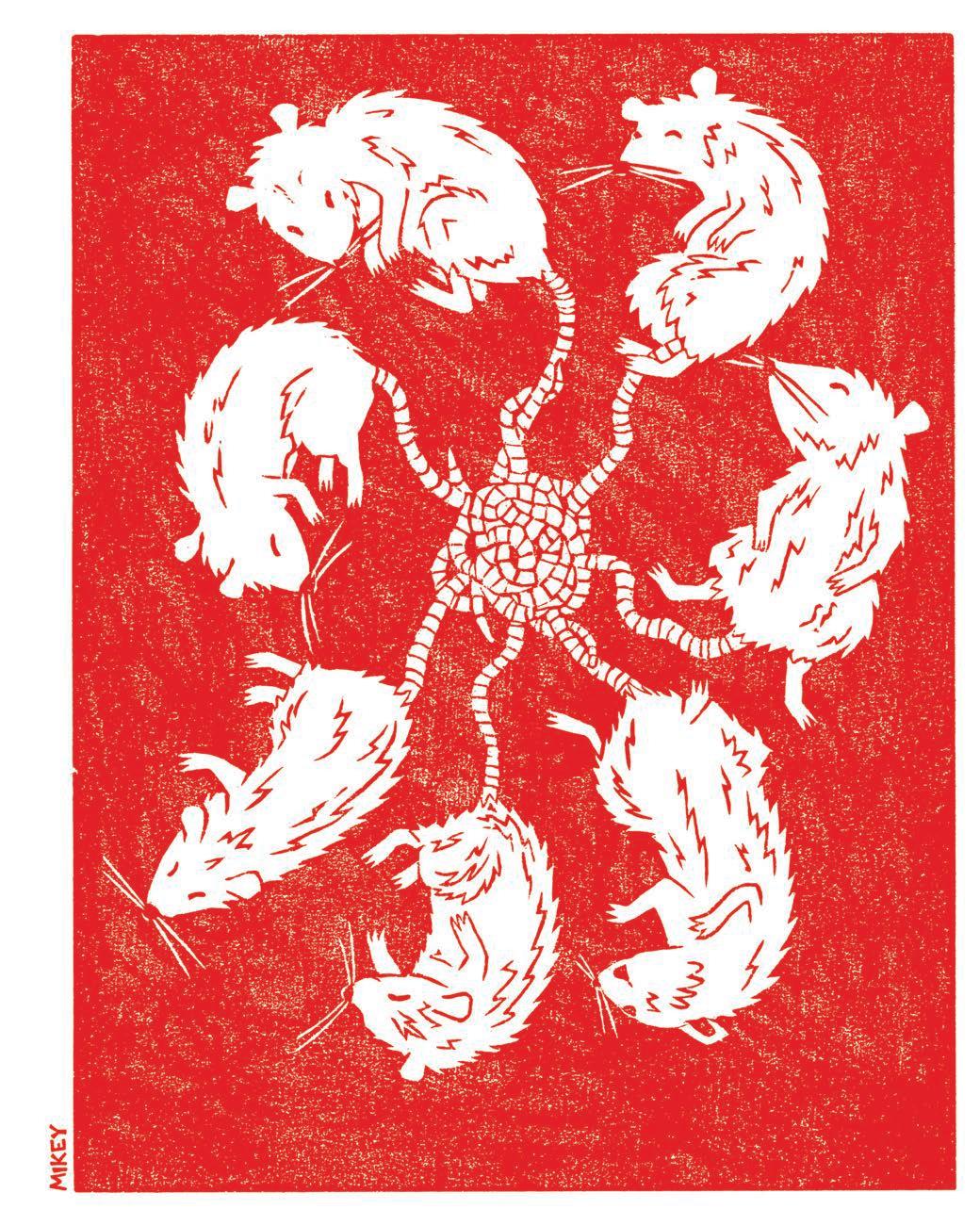
16 06 CULTURE ĀHUA NOHO Different
Different Landlord Breeds of

An Ecological Guide to Dunedin’s Most Invasive Species
By Zak Rudin and Annabelle Parata Vaughan
Nestled throughout the sprawling ecosystem of Dunedin lies perhaps the most pervasive pest of all: the landlord. They come in all different shapes and sizes, marking territory in their own unique and equally infuriating ways. With each species of landlord comes a different experience. Critic Te Ārohi decided to launch an ecological investigation into the different breeds of landlords and compile them into a comprehensive list, so you know what kind of pest you’ll have to control the moment you sign your lease.
17 06 CULTURE ĀHUA NOHO
It’s fairly ubiquitous how shit the Dunedin flatting experience is. Cold, damp, and moldy flats are common stories amongst students. You might assume that these tips are managed by landlords who have too many properties to be attentive, but the results from our investigation were surprising. Turns out the Big Dogs, the ones who own upwards of 20 properties apiece, have some of the nicest properties in North D.
A lot of the flats owned by the Big Dogs along Leith, Grange, and Hyde are cookie-cutter new builds or ones that have recently been “refurbished”. However, having a nice flat that actually feels like a home comes at a pretty penny. Students from one such flat on Grange owned by AJ Hooker said that they were paying $900/week for 3 bedrooms. Ouch. The most common price range seemed to sit around $175 to $200/week per room. One student on Leith said they were “paying less [than last year] for a better flat.” What’s more, most of the Big Dog landlords actually seemed to get shit done. This could be down to the fact that owning a newly built flat means that, generally speaking, they’re pretty low maintenance. But still, having a communicative landlord is definitely a win.
The Big Dogs Rat Kings
The Rat Kings are perhaps the most well-known and notorious breed of landlord. While all landlords are in the business of exploiting capitalist structures of power inequality, no other breed does it more obviously than the Rat Kings. Critic Te Ārohi spoke with a group of girls on Castle that had the misfortune to end up in a flat owned by one such vermin. The flat had all the classics: black mold, holes in the floor (which also happened to be rotting away), glass everywhere, failure to meet Healthy Homes Standards, etc., etc.
To add to this, the place was a mess when they moved in. When they contacted the property manager, they were told: “Clean it yourself.” Now, Critic Te Ārohi is no expert, but that sure does not sound legal. So, we consulted one. Janet Robertson, previous Tenancy Tribunal adjudicator and current adjudicator of the Disputes Tribunal, told Critic Te Ārohi, “The Residential Tenancies Act requires the property to be ‘reasonably clean and tidy’ and ‘reasonably maintained’ [before tenants move in].”

Another student flatting on Fredrick told Critic Te Ārohi that they were “welcomed in true Dunedin fashion with mold, water damage, zero insulation, a floor so cold that shoes indoors was essential to avoid frostbite, a tiny office turned ‘bedroom’, and a room we were literally locked out of due to not being earthquake safe.” Nice.
Of course, there are still some classic dirty Dunners flats owned by the capitalist elite. But for the students lacking that sweet, sweet intergenerational wealth, it’s really the only option. One student on Grange was pretty open about the fact that his flat is “a bit of a shithole” for a place costing $150/week per room.
From a practical point of view, being dragged through Tenancy Tribunal is admin for landlords as well as students, so owning over 20 properties comes with a certain amount of responsibility. One student Critic Te Ārohi spoke to on Grange said, “I don’t know about the economics, but from a personal perspective the landlord is good.”
Critic Te Ārohi’s theory is that, since the biggest landlords are deep in the business of property management (*cough* hoarding wealth), they make it their full time job. One student on Leith told Critic Te Ārohi that “the flatting culture is greedy in Dunedin,” adding, “you’re forced to sign flats at least three months before moving in.” The student mentioned that her brother in Pōneke Wellington has had a much better time of it. “The culture [in Pōneke] is better because you start paying when you move in,” she said.
These experiences are hardly uncommon, but that does not mean that they should be the standard. “It feels bad to complain, as it’s hardly a unique experience for Dunedin students, and one that’s just as commonly celebrated with a ‘gotta have a shit flat once’ attitude,” said the Fredrick Street resident. Critic Te Ārohi recommends that you should complain.
18
06 CULTURE ĀHUA NOHO
"a floor so cold that shoes indoors was essential to avoid frostbite, a tiny office turned ‘bedroom’, and a room we were literally locked out of due to not being earthquake safe."
Girlboss Landlords
Girlboss landlords are the best of the worst; they are the lesser of two evils, the maternal figure you need, the home away from home. However, they spark an ethical conundrum within your soul. They make you think that commodifying the human right of shelter perhaps isn’t so bad after all. Girlboss landlords usually own a humble one or two properties, or they are property managers for smaller, more niche real estate companies like Darling Realty or Metro. They always have cool mom names like Jennifer or Christine, and are also usually Virgos.
Girlboss landlords reply to your emails in minutes. Your flat needs a repair done? Thanks to your Girlboss landlord, there will be a tradie over the next morning. Black mold or leaking pipes? Your Girlboss landlord will go to the ends of the earth to make sure you live in comfort and serenity. Lodged your bond refund form? Find your entire bond in your account within three business days. The Girlboss landlord is the type to leave chocolates behind after a flat inspection, and she will most happily be your flatting reference for all of eternity. But, like all girlbosses, she must be treasured and not taken for granted. Ethical conundrums aside, a Girlboss landlord is a deeply appreciated but rare species in the ecological system that is North Dunedin. But she’s still a landlord.
Ghost Landlords
Ghost landlords typically have a fair bit in common with Rat Kings and more often than not might be one and the same. This shifty breed of landlord typically owns fewer properties than the Big Dogs and hires property managers to “take care of things.”
Ghost landlords are identified by their absence. Their invisible presence makes it near impossible to get in touch with them directly. One group of students that Critic Te Ārohi interviewed on Castle said they have “no idea who the landlord is,” and have had “no communication” with them. Instead, the students only had “unreliable” contact with Cutlers, a property management company that manages over 80 flats. Unsurprisingly, when the students moved
in, the flat had not been cleaned. However, when they got in touch with their property manager, they received an “apology” but were told that it’s the “landlord’s responsibility” to make sure that the flat was clean. This put the Castle residents in a bit of the ol’ catch-22 situation, forcing them to clean the property themselves.
These paradoxical scenarios of landlords hiding behind property managers which hide behind landlords are not uncommon. We can only wonder if, at a certain point, the zero accountability paradox opens a vortex to another dimension. Either way, if you find yourself in a similar situation, it might be worth taking your landlord to Tenancy Tribunal.
Outside of economics, if you find yourself facing off against your landlord about that oven that isn’t working, or that hole in the floor, you do have some power to fight back (legally, not literally). For the low price of $20, you can file a claim to the Tenancy Tribunal and be heard before an adjudicator within a few weeks - just fill out a form online at tenanacy.govt.nz. Whether you're after justice, compensation, or both, for $20 it’s worth a shot.
19
The Girlboss landlord is the type of landlord to leave chocolates behind after a flat inspection, and she will most happily be your flatting reference for all of eternity. But, like all girlbosses, she must be treasured and not taken for granted.
06 CULTURE ĀHUA NOHO
Moshers of the world, unite! Why mosh culture has changed and how we can f ix it
 By Hugh Askerud
By Hugh Askerud
Trapped in every student’s soul is an immutable desire to mosh. Whether that be in a crowd of hundreds or alone in a crusty bedroom, mosh culture is fundamental to the plight of every student. As the age old saying goes: “Up there’s for thinking, down there’s for dancing.” The phrase works better when gestures are involved, but we’re sure the implications are not lost on you. Alas, whispers from the student body suggest mosh culture is ceasing to be as soul-quenching as it once was. Reports from this year's O-Week alone portray a mosh corrupted by sin. Students thoughtlessly thrashing into one another in efforts to get to the front of the crowd saw an unbalanced mosh which was either too thickly or too sparsely populated, like a poor vegemite spreading attempt. But what do the students embroiled in the seething carnage have to say about the drastic changes?
Bridie, a mosh-hardened student, reflected on the new culture, saying, “You always come away with a lot of bruises.” Despite this claim, Bridie then went on to explain that one “always has a good time in a mosh even though there’s not that many… someone should host a mosh party to change that.” Bridie’s claims paint mosh culture in an interesting light, one where the mosh is simultaneously exhilarating and violent. Unfortunately, Bridie’s testimony did little to explain the drastic changes which mosh culture has been grappling with in recent years. In an act of desperation to answer this question, Critic Te Ārohi had a chat with our photographer Connor who has witnessed countless mosh pits while on the prowl for photos.
In a moment of prophetic wisdom, Connor mused that “moshes have been very pushy in the past but the atmosphere has changed completely. Pushy moshes are the worst,” he said. “What you’ve got now is the occasional fight breaking out but a more relaxed vibe.”
Putting Connor in his place, Critic Te Ārohi’s Designer Molly spoke up to defend the mosh madness of yesteryear. Molly said, “True moshing comes from punk. It's a response to institutionalism. At the end of the day, it's a healthy, safe way to let out emotion.” With fire in her eyes Molly continued, “You’re there for the violence…and when you get knocked over, people pick you back up without hesitation.” Tensions were running high in the Critic office after these conflicting interviews, reflecting the immense importance and intensity of mosh culture.
A clear picture of today’s mosh culture emerges when merging these viewpoints. Like Connor suggested, moshes of today are pushy at times and at other times disparate, perhaps reflecting the atomised nature of individuals within society. Unable to push against one another, mosh monsters of today have no suitable means to express themselves; their anger has been bottled up. Instead, violence erupts spontaneously as individuals crack under the expectations which are put upon them by the ever-watchful eye of the mosh. Mosh culture really is this deep, Critic Te Ārohi swears.
To gain a more substantive perspective on the matter, Critic Te Ārohi managed to venture outside the office to speak with Sociology professor Marcelle Dawson. Speaking generally, Dawson commented that “humans are social creatures and need other humans to survive. It’s as simple as that. People need to commune with one another, both to fulfill and to express their shared humanity.” Though Dawson’s idealism was admiral, it would be bold for anyone to attribute a desire for shared humanity to the teeth-gritting carnage of mosh culture. Elaborating on dance specifically, Dawson said, “Particular forms of dance can also be used as a show of defiance or resistance against oppression. The knock-on effect is a sense of solidarity among those who are participating against a common oppressor.”
Substantiating Molly’s claims, Dawson depicts dance as a necessary sociological tool used to inspire solidarity amongst embittered souls. Doesn’t that just make you want to mosh?

21
Moshers
” 06 CULTURE ĀHUA NOHO
You’re there for the violence…and when you get knocked over, people pick you back up without hesitation. ”
In Dawson’s response, we find both a picture of what the mosh should be and thus the key to unlocking its potential now. To reclaim the former glory of the mosh we must not let ourselves be atomized by our own self-consciousness and fear. Instead, the mosh must be symbolic of the societal unity and change which we wish to see reflected in the world. Thus, the solution to a degraded mosh culture is simple: bust a move and don’t be afraid to give yourself entirely to the mosh. Moshing is a trust activity, and mutual trust breeds mutual compassion. Even if it can be violent at points, don’t be afraid to let yourself go - someone will always be there to pick you up.


” ” 06 CULTURE ĀHUA NOHO
To reclaim the former glory of the mosh we must not let ourselves be atomized by our own selfconsciousness and fear.




ARONUI 06 FEATURES
THE GENERAL CONSENSUS: CLUBS ARE ESSENTIAL, MULLETS ARE DONE, AND DNB SUCKS. AND CASTLE ST?
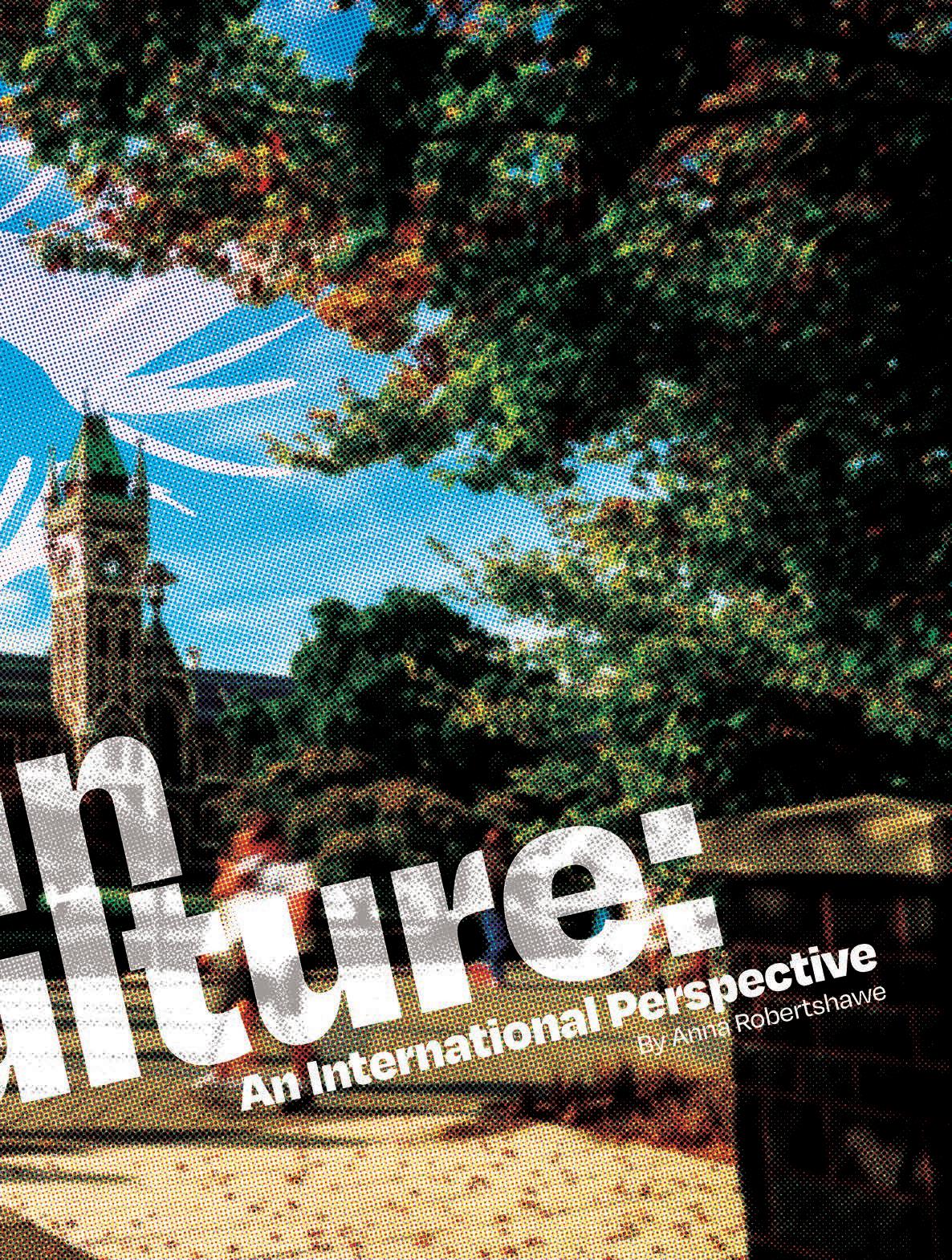
ARONUI 06 FEATURES
“THERE’S NOWHERE ELSE LIKE IT.”
Now that the Covid monster has been slain (in the eyes of policymakers at least), the borders have opened and Dunedin has welcomed a swarm of international students finally able to fulfil their questionable dreams of studying at Otago. This year, the University has more than 750 international students commencing study compared to the approximate 200 this time last year, which the University’s acting ViceChancellor Professor Helen Nicholson was happy to report. But how’d we attract students from around the world to Dunedin of all places?
A few clicks onto Otago’s International Students’ hub reveals a million reasons why they should fork out thousands of dollars to study at the prestigious University of Otago. Pictures of the historic Clocktower framed by pink cherry blossoms sit alongside photos of students in big glass windows sipping coffee and laughing. Naturally, the University has made the intelligent marketing decision to leave the rest out.

It makes you wonder whether these students knew what they were getting themselves into when they bought a plane ticket to Dunedin. Critic Te Ārohi sat down with some international students studying here to gather some insight into what it’s really like to rock up to Dirty Duds.
Sarah, here on a semester exchange from her uni in Minnesota, hadn’t heard much about Otago when she applied besides that it was an “old school, has a lot of people, and a good geology program.” Needless to say, Sarah was “surprised” when she arrived and saw the glass-strewn streets and heard DnB vibrating behind those advertised cherry blossoms. “I was surprised that [some of this stuff is] endorsed by the school. At my school that would never be a thing.” She also didn’t expect a whole Facebook page dedicated to parties, nor a party culture that operates every day of the week. “I didn’t expect things every night of the week…that really threw me off.” After attending her first Castle St party, Sarah was astounded. “It was unlike anything I’d ever been to. There were about as many people on the street as there are in my whole class at home”.
“TOP RANKING";GLOBAL “OUTSTANDING GRADUATE EMPLOYABILITY”; “ACADEMIC EXCELLENCE"; “AMAZING FACILITIES”; “EXTREMELY HIGH STUDENT SATISFACTION”; “SUSTAINABILITY AND POSITIVE SOCIAL “UNMATCHEDIMPACT”; STUDENT EXPERIENCE”.
ARONUI 06 FEATURES
Natasha is a full-time international student from Colorado. “My dad told me 'stay away from Castle St and don’t burn couches'. I had no idea what he even meant by that 'till I got here.” Like Sarah, Natasha recognised that there is “some inconsistency” between the way the University advertises itself and the reality of Dunedin student culture: “You search up the Uni and see this beautiful campus, and all these beautiful professors, and everything OUSA says. But you don’t hear about the couch burnings and the broken glass.”
In contrast, the party culture and residential vibe of the University was part of what drew Whitney to Otago, here on a semester exchange from Seattle. Although, she was still surprised to see what a Castle party is really like. “It’s just, like, funny. It was such an event I would never see at home,” where she said she was accustomed to the different partying habits. “At home there’s frat row and Greek life,” but street parties are not a thing. “We have to stay inside the house, otherwise you get in trouble.”
Reid, a full-time international student from California, had heard a little bit about Dunedin student life but it wasn’t what attracted him to the University. “I just saw that it was a good Uni,” he said. When he arrived here, he saw that the Dunedin lifestyle was “not normal uni stuff... [Students are] more focused on the social and partying aspect. It’s ingrained in your experience here. People take pride in the party scene.” Eddie came to Otago from Fremantle, Perth to complete his one-year postgrad. He knew Otago had a “better student culture” than his previous university. At first, he found the party culture a “bit of a shock”, and “a bit overwhelming.”
“It’s false advertising,” said Keegan, an international student from Lake Tahoe. “I think it’s poor for the University to do that.” She was drawn to Otago after watching an exchange student’s study abroad video on YouTube. “I thought, ‘That looks pretty.’” But she really knew nothing about Dunedin when she moved here. “There’s definitely an inconsistency between how the Uni presents itself and the reality.” Keegan herself didn’t mind because she likes the partying
and drinking side of things. “However, you have a lot of people who come over here who might not. The way that students bond with each other is drinking. Others can feel left behind.”
Emily, finally here from Bali after studying as a distance student since 2021, isn’t much of a partier and has never engaged in the party scene of Dunedin. “I had no idea about the drinking culture. I only learned about it when I got here.” She felt that the University advertises itself as a “peaceful university with a prestigious reputation,” and could “mention [the student party culture] in a few more things.” However, Emily didn’t feel that it had negatively impacted her time here, as there are a lot of other options for students who are not big partiers.
Karl isn’t much of a drinker either. Here from Germany as a full-time international student at the Polytech, he didn’t know anything about the party culture, discovering it upon arrival. However, he has still found it easy to get involved in other things, having joined the tramping club and attended other events put on by the Uni.
PICTURES OF THE HISTORIC CLOCKTOWER FRAMED BY PINK
BLOSSOMSCHERRYSIT ALONGSIDE
PHOTOS OF STUDENTS IN BIG GLASS WINDOWS SIPPING COFFEE AND LAUGHING.

ARONUI 06 FEATURES
Dunedin’s party reputation is bolstered by the fact that it’s the only place in the country where undergrads dominate an entire area of the city. Otago’s International Director Jason Cushen told us that “Otago is New Zealand’s only ‘residential campus’ with close to 20,000 students (including Polytech) located in the North Dunedin area. While the start of the academic year often results in a large number of social activities in the North Dunedin area, this is not reflective of the daily community culture in the student area.”
But when the parties are on, they’re on. “It’s the experience I was looking for,” said Keegan. Whitney has found it “really cool”, and Eddie said it’s been a “defining factor” of his time here. He said that nothing like a Castle St party would be able to happen in Australia, because Police presence would be “way too high… I reckon there’s more acceptance from the cops here.” On the other hand, Karl sees it as “a bit out of control”, and Emily feels it tends to be “disruptive” at times. Sarah actually found it a bit underwhelming; after attending a few Castle parties, she had expected more people to be dancing and socialising or playing some sort of games. “I felt like when I was there most people were just sort of standing around and drinking and not doing a whole lot else.” Yeah. Welcome to Dunedin, Sarah.
And then there’s the soundtrack to these parties: Drum and Bass. Aidan told us that he wondered “why all the flats are playing the same song on repeat for at least a month after I got here.” Whitney was a “big fan”, but Eddie reckons “DnB sucks. They’re just butchering good songs with shitty remixes.” Sarah agreed: “DnB - not a fan.”
One thing the students could agree on was Dunedin students’ unprecedented obsession with throwing things, particularly glass. “It pisses me off when we break bottles in the street and burn furniture,” said Natasha. “We should take better care of our North Dunedin area.” Whitney knew Castle was “notorious for parties and broken glass,” having read articles online about what the town is infamous for. “The glass throwing is definitely different. People would get arrested for that at home.”

Despite the glass, Whitney found Castle to have a nice “communal” and “wholesome” vibe. But she was in the minority. “I’ve never had a good time there,” said Natasha. “Pimps and Hoes night, that’s just fucked up.” She also had a bit of an altercation one night on Castle where “two guys got in this fucking fist fight next to me and I got punched in the face because I was in the wrong place at the wrong time.”
Dunedin students' ability to balance academics and partying is one that has been expertly honed throughout generations. Business up front, party in the back, just like their hair. “More mullets per capita than anywhere else I’ve ever been,” said Eddie. But for international students who are just entering the game,
finding that balance can be tricky. Sarah feels like the academic structure lends itself to more partying, and more partying lends itself to less academic motivation.
“Coming in as an outsider, I’m still trying to find that balance.” Karl also found that the New Zealand standard of education is a lot less “strict” than in Germany. “The general vibe is more relaxed.”
In terms of support given to international students by the Uni, a lot of full-time international students felt as though the University could improve on their available support systems. “I think support for longer term international students is still developing,” said Keegan. According to Reid, they sometimes “kind of feel like second best to domestic students.” In particular, the University no longer helps with student visas, which they used to do in 2020. “The last two years we’ve had to do it ourselves. It’s definitely harder now.” International Director Jason Cushen said Immigration NZ retired their Provider Direct Visa-on-campus service in December 2021, but the University is still supporting students indirectly wherever possible.
In general, exchange students felt that the University does a great job at providing support to international students. “I feel like the support has been better from Otago than my home school,” said Sarah. Whitney felt the same: “The Uni has been super helpful. Even just getting my login and classes figured out. AskOtago was great. They’re amazing and do everything for you.” Upon coming to the University, Emily found that the institution has provided “pretty good support”, being “responsive to emails” and helping with her initial orientation. The clubs and societies offered at Otago are also great for international students. “They provide so much support,” said Reid. Keegan is also a “huge club proponent” as a way for “exiting from drinking culture.” Natasha said they are where she’s found “the best friends and parties.”
So, life in Dunedin has been surprising for some and shocking for others. But, overall, the international perspective appears to be a positive one. As notes of foreign accents waft throughout campus, it invokes a certain feeling of gratitude to be able to once again live in an open world and be able to share our little piece of it with people from all over. To all international students: Nau mai, haere mai. Welcome to Dunedin, we’re happy to have you back.
30
ARONUI 06 FEATURES
A “PEACEFUL UNIVERSITY WITH A PRESTIGIOUS REPUTATION.”


ARONUI 06 FEATURES
Dunedin: The capitalRTD
By Anna Robertshawe
When you’re drinking four nights a week, the contents of your can becomes a hot topic. Stories are told about that mean Byron Bay drink you had last Thursday, and how you can never go back to Part Time Rangers since you fucked out in the curb outside Rob Roy in first year. RTDs do more than intoxicate; they tell stories, hold memories, and they taste pretty damn good. As a result, they have formed a core part of Dunedin’s drinking culture. But they haven’t been around forever. The first RTDs of our generation consisted of the likes of Cruisers, Part Time Rangers, Billy Mav’s, Cody’s, KGB’s and Purple G’s. Needless to say, there was not much of a range. According to Jamil, co-creator of Greenhill Seltzers, things have changed since he attended Otago in 2017: “The liquor store looked a lot different back then - lots of Billy Mav’s and sugary stuff. Walking into Leith Liquor is way different to what it was five years ago.”

Cruisers are now associated with Year 11 house parties, and the likes of Cody’s and Billy Mav’s have largely been annexed by the male population. When asked why he drank Billy Mav’s, one male party-goer replied, “Because they taste fucking awesome.” There was no suggestion of preserving his fragile masculinity at all. St Patrick’s Day saw the sale of countless boxes of green Cruisers, which one boy said was the “only appropriate time for him to shamelessly consume a Cruiser box.” Another girl said she didn’t understand why everyone hates on Cruisers: “I love them. Cruiser-haters can get fucked.”
Needless to say, the original RTDs have solid fanbases, and it's difficult to convert die-hard fans away from their timeless favourites. But recent years have seen Dunedin students attempt to do just that, creating a new wave of tasty RTDs which now define the modern Dunedin drinking experience including Greenhill Seltzers, Fizzliss, and Cheeky Hard Iced Tea. All three of these RTD brands were created by Dunedin students, each influenced by their experience with the party culture here. “We all did a lot of drinking. That’s where the idea came from,” said Jamil.
33 ARONUI 06 FEATURES
According to RTD creators, Dunedin is the “only authentic uni experience” and “100% the best place to start a drinks company.”
Max Broadhurst, co-creator of Fizzliss, graduated in 2021. He remembered drinking culture being a “big part” of his time in Dunedin: “Everyone kinda looks forward to the weekend and gets uni out of the way so they can party.” The idea came about in his second year during which he flatted with co-creator Zac in Death Star where they admittedly drank an “unhealthy amount…It got to the point where we were really sick of all the fizzy RTDs on the market. We started mixing juice and vodka so we had no bloating and burping and all those annoying side effects.” But the process of creating a product and starting a business while studying isn’t always going to be smooth sailing.
“At first, we had a bit of a nightmare... We didn’t do enough testing on everything, and people weren’t too happy about it.” But once they fixed the recipe, they sold well in Dunedin and Christchurch after “rebranding and professionalising everything.”
Oliver Despatis and Brendan Yielder are the creators of Cheeky Hard Iced Tea, having met in their second year at Otago studying marketing. They ended up starting their business through ‘Audacious’, a business programme that partners with the University.
According to Brendan, they didn’t want to create a brand that took itself too seriously, hence the name ‘Cheeky’.

Brendan and Oli also faced challenges in the beginning. They started their business in 2020, the year of Covid. “We had only met two weeks before we started the business,” said Oli. After that, “for about two months we started the business on Zoom.”
Breaking into the competitive market of RTDs takes perseverance. Jamil said they were determined from the beginning to get Greenhill Seltzers into Leith Liquor.
“If you get into Leith, that’s like the first hurdle for new brands.” Three or four years ago, the boys rocked up to Leith Liquor with a van full of their drinks. “People usually sort floor space out months in advance. But we had just driven down from Tauranga and had the van right outside.” After some convincing, “they said they would make room for us.” After that, they tried to get into Super Liquor on Cumberland St. “We had to send in 20 people and keep persevering.”
The small number of liquor stores in North Dunedin means that there’s a concentration of drinks, making it easier for brands to expand sales quickly from just a few outlets. “It’s special how there’s two or three stores that cater to everyone,” said Jamil. “It’s great for us, because we don’t need to hit up 20 stores, just the two main ones.” The liquor store culture is different to places like Wellington, where they “don’t even do tastings during O-Week.” The process is much more interactive in Dunedin, contributing to the atmosphere of excitement and anticipation that comes with trying a new RTD on your next night out.
Max says his experience in Dunedin has contributed to the success of Fizzliss “a huge amount…if I didn’t go down to Dunedin and wasn’t a part of all the parties and drinking, I would have never really noticed.” Being in the middle of it allowed him to get an insider’s perspective, saying that it was good “being able to have easy access to the future of drinking, and go to parties and ask people what they think about it. We could soon see there was a gap in the market.”
The Cheeky creators said that a flat party provided a solid opportunity for “market research”. Living in Dunedin “probably gave us a lot of meaningful insight with respect to an RTD brand that similar brands aren’t gonna have.” Before they even launched their product, Brendan and Oli “started making iterations in Brendan’s kitchen flat. We would make 20-40 litres of it, put it in cans, throw parties at the flat, and see what people thought of it.” That way, they could get “instant customer feedback…It was a good way to test the market.” Of course, testing the market is easy with such enthusiastic test subjects.
The flat party culture of Dunedin also contributes to the prevalence of RTDs. “Having an RTD is like bringing the bar experience of a cocktail to the flat party,” said Brendan. Since the closing of student bars and invasion of fresher-packed nightclubs, flat parties are the main way to socialise on a night out in Dunedin. “With flat parties, you’re spending a good portion of your night there. You’re gonna want to have an exciting, different drink. It makes sense that you want a pretty tasty RTD that you wanna sesh on all night.”
Ultimately, the sheer amount that Dunedin students drink makes us the most willing to give new things a go. “People are willing to try new things and back small brands. That’s the main difference between there and somewhere like Auckland. They’re more willing to give it a go,” said Jamil. “It probably helps that people drink three to four nights a week. People drink a lot so they get bored.” According to Max, Dunedin culture is “get it in ya, give it a try.” Dunedin provides the beauty of “word-of-mouth marketing.” If one person gets a new drink and they like it, it “spreads like rapid fire.” Oli also attributes a lot of their business success to the attitude of Dunedin students towards drinking. Had they not been in Dunedin, “it would have been completely different…In Auckland, customers would have been more scared to try something new. In Dunedin, if it’s a drink, people will try it.”
However, things are beginning to change as the University and Police are clamping down on party culture and the crazy antics of Dunedin students.
ARONUI 06 FEATURES

ARONUI 06 FEATURES
"In customersAuckland,would have been more scared to try something new. In Dunedin, if it’s a drink, people will try it.”
“The whole world’s getting more PC about drinking,” said Max, referring to the new regulations lowering the alcohol percentage of RTDs. This also means drink companies are being discouraged from sponsoring Castle St events and displaying their banners on student flats.
One RTD brand came down for the most recent O-Week. “We got told by the cops and the Uni that we have to be careful with sponsoring - no banners. They wanna reduce the drinking culture, I guess. If parties have an alcohol sponsor and they’re promoting an alcohol brand, they think it's gonna increase the consumption and normalise it a bit more.” Drink companies rely heavily on Dunedin O-Week events to advertise their brands and get involved in the festivities. Now they’ve had to find loopholes to continue to get that exposure. “We just give flats drinks in return for some social media exposure, nothing related to any parties.”

Sergeant Stephen Jones is the head of Alcohol Harm Prevention at Dunedin Police. According to Sergeant Jones, the North Dunedin area and particularly Castle Street is “one of the most high risk and vulnerable communities for alcohol harm in New Zealand.” He says companies that use this area to promote their brands are attempting to “exploit this community by providing sponsorship through money, product, and advertising.” This often occurs when the community is “at its most vulnerable”, such as Flo/O-Weeks and Hyde St. “In doing so, these companies are engaging in the irresponsible promotion of alcohol and run the risk of being prosecuted under the Sale and Supply of Alcohol Act 2012,” he said.
It’s unlikely that Dunedin’s drinking spirit will change any time soon. RTDs and Dunedin have a symbiotic relationship - one fuels the other. RTDs provide a tasty and exciting drinking experience for Dunedin students, while Dunedin students provide RTD companies with the perfect market and testing ground for their products. It’s safe to say that, without Dunedin, RTDs would not have the same foothold they do today. “Dunedin is the heart of the future of drinking culture in the whole of NZ," said Max. “It’s probably our top place that sells the most, and we have the most recognition there. Dunedin is 100% the best place to start a drinks company.”
36
ARONUI 06 FEATURES



Tini Whetū Project

 By Jamiema Lorimer
By Jamiema Lorimer
Tini Whetū Project Space is an experimental art gallery and space, curated by Piupiu Maya Turei (Wairarapa Moana, Te Ātihaunui-aPāpārangi). Tini Whetū is situated in the upper level of Yours on Moray Place, in both the corridor leading to Evening Bookstore and the bookstore itself.


Piupiu has been doing art curatorial work in Ōtepoti since 2019 and has curated shows at the Polytech, Dunedin Public Art Gallery, and for Dunedin Dream Brokerage. Tini Whetū is Piupiu’s first permanent gallery space of her own. The space came to be early this year, after Evening Books put out a call-out in hosting an art gallery to complement the space.
Having come from an academic art background and working in curating for a number of years, Piupiu is aware of the many barriers in the art world of Aotearoa, particularly for Māori. Her curatorial practice is about removing these barriers for the artists and public alike. “I’m really interested in not being exclusionary,” said Piupiu. “It’s not about a gallery which shuts people out because the content is gate-kept. Artworks are open and accessible for anyone to understand, however they want.”
RANGITAKI 06 COLUMNS
Project Space
In creating a gallery that is inviting to the public, this is about showing engaging exhibitions while not presenting them in ways that exclude the audience. “It’s about finding other ways to put out art. Not heaps of big words, just lots of big feelings.” For artists, Piupiu’s focus is on how their experiences in creating then showing this art can be most enjoyable for them: “That’s the experimental part of the gallery for me. Less ‘how I’m showing work’ and more ‘how do I go about showing the work?’…How do my politics around mutual aid, sharing, giving people autonomy and power, relate to running a gallery?”
Piupiu’s curatorial practice is also shaped by her anarchist upbringing. Her mum was involved in multiple anarchist groups, manifesting in Tini Whetū holding a space at the anarchist co-op, Yours. “The crossover for me, of te ao Māori and anarchism, is centred around the idea of manaaki,” said Piupiu. “Everyone has a place.” Piupiu’s hope for Tini Whetū is ultimately that it will be a space where everyone feels safe in encountering, interpreting, and learning about art. More personally, Piupiu also hopes it can be a place of connection for Māori anarchists where they can feel “this is usthis is my cultural self, my actual

self and my politics, as an art gallery.”
Tini Whetū’s grand opening was on February 22 with two exhibitions: Te Mahi Peita, by twelve local Māori artists, and Kare Ā-Roto, by Angus Tahere Hayes. The coming together of Te Mahi Peita particularly embodies the creative freedom Piupiu aspires to in her curatorial process. The artists were invited to directly draw their art onto the walls with paint pens over three sessions. “There was lots of laughter and we listened to music. [Installation] is the most stressful part but it made it feel really chill and easy-breezy.”
Through installing directly to the walls, the exhibition also speaks both to the use of graffiti as a political tool and to the earliest artistic tradition of rock paintings. Kare Ā-Roto is from the private collection of the late artist, Angus Tahere Hayes, a takatāpui community worker and artist in visual art, writing, and music. The title loosely translates to emotions and the painting depicts an individual brushing their hair.
You can see both exhibitions now at Tini Whetū, on the upper-level of Yours. Follow Tini Whetū on Insta at @tini.whetu.projectspace.
Exhibitions and artists
Kare Ā-Roto: Angus Tahere Hayes
Te Mahi Peita:
Vicki Lenihan (Waitaha, Kāti Māmoe, Ngāi Tahu)
Heramaahina Eketone (Ngaati Maniapoto/ Waikato)
Megan Brady (Ngāi Tahu, Ngāi Tūāhuriri, Pākehā)
Jessica Hinerangi Thompson- Carr (Ngāruahine, Ngāti ruanui, Ngāpuhi)
Madison Kelly (Kāi Tahu, Kāti Mamoe, Pākehā)
Georgina May Young ( Te Ūpokorehe, Te Whakatōhea, Pākehā)
Mya Morrison-Middleton (Ngāi Tahu)
Toa Emmett William Makapelu (Pautini Ngaitahu)
Aidan Taira Geraghty (Ngāi Tahu, Kāti Māmoe, Waitaha)
Aroha Novak (Ngāi te Rangi, Ngāti Kahungunu)
Zoe Hikairo Moreho (Ngati Maru, Ngati Hikairo, Tainui) Jacob Tucker (Ngaati Apakura)
Curator:
Piupiu Maya Turei (Wairarapa Moana, Te Ātihaunui-a-Pāpārangi)

39
RANGITAKI 06 COLUMNS
In the Eyeof the


40
RANGITAKI 06 COLUMNS
Amira Jain & Joseph Anderson
the Beholders
This week: Keeping it Complex, Keeping it Connected
Joe: This piece feels like stepping inside the collection of a giant. You don’t know where to look at first because it’s so comically big.
Amira: Are we looking at the BFG’s crayon collection?

The answer: Not even close, come on now. We’re looking at Emily Floyd’s Keeping it Complex, Keeping it Connected. Obviously.
Keeping it Complex, Keeping it Connected is a 27-metre-long art installation currently on display at the Dunedin Public Art Gallery. The installation is the centrepiece of Emily Floyd’s exhibit, which includes various other pieces inspired by, in the words of the Dunedin Public Art Gallery, “meaningful, collaborative, narrativebased learning”.
Despite the scale of the installation, the simplistic and colourful design of tumbling books will remind you of every primary school classroom you’ve ever set foot in. Keeping it Complex, Keeping it Connected creates a sense of nostalgia and reminds you of the times when you couldn’t even tie your shoes, let alone piss up on a Wednesday. And if you want to keep that feeling going, then be sure to have a go at the interactive stamp tables set up throughout the exhibit. Every little crumb of nostalgia helps, right?


And that is exactly what separates Keeping it Complex, Keeping it Connected from the other 27-metre-long art installations in Dunedin. Various tables are set up throughout the exhibition with paper and stamps for you to make whatever you want with, which is what we spent 90% of the time doing and forgot why we were there in the first place. Which means that the exhibition was effective, right? We certainly thought so. For a minute there, there was no climate crisis, there were no exams, there were no bins to take out. There was just the arts and crafts room of a big, friendly giant.
Recommended song for your visit: Washed Out – The Grogans.
41 RANGITAKI 06 COLUMNS
This column is supported by DPAG, but they have no influence on the reviews.
EMILY FLOYD Keeping it Complex, Keeping it Connected 2022. Installation view, Dunedin Public Art Gallery.
Photograph: Justin Spiers
VEGGIE SPAG

Want to avoid getting sick as it gets a bit colder? This veggie packed spag bol will help keep your immune system sharp as a tack. Add more protein if you want! Stir-fried beef would go well with this.

INGREDIENTS:
Oil
1 brown onion, diced
2 tbsp tomato paste (optional)

2 garlic cloves, diced
2 carrots, grated
A 400g packet of mushrooms, sliced
2 cans of brown lentils, drained
DIRECTIONS:

2 cans crushed tomatoes
Large handful of frozen or fresh spinach
(optional)
Salt Pepper Sugar
Pasta (spaghetti is best)
Add a drizzle of oil to a pan on medium heat. Cook the diced onion for a few minutes before adding in the diced garlic and the tomato paste. Let that cook for a minute. Add in grated carrot and sliced mushrooms and let that cook for two. Now add the lentils, crushed tomatoes and spinach. Season with salt, pepper and a sprinkle of sugar and let that simmer away.
At the same time, boil a pot of water to cook the pasta in. If you wanted to add beef now would be a good time to cut it into thin strips and fry it in oil.
Salt the boiling water and cook the pasta to al dente. If you throw the pasta against your wall and it sticks, it's done. Add pasta to the plate, top with the tomato veggie mix and salt. YOM.
Serves 6. 7 at a push.
RANGITAKI 06 COLUMNS
FIND ME ON INSTAGRAM
ALBERT
HAÄGEN STRØNG
Haägen Strong is a favourite beer of men who like to drink on park benches at 11:30 am.
Initially launched as a wartime ration distributed to the ANZACs, Haägen Strong has found its way to being a staple across the diets of many New Zealanders. Trying to find a can of this stuff while it’s on special at the supermarket is difficult, as its primary consumers are swift and will have all cans cleared out before midday. As people get more and more burned out, you can’t walk down the street without passing someone with one of these in their hands.
I was entirely prepared to shit all over Haägen Strong due to my sordid past with its weaker counterpart, but I was wrong. To test the stronger variant, we picked up 72 bottles of Haägen for cheap. We didn’t know the bottles were plastic nor that they had been left in the sun until expiry. We had essentially bought ourselves a trough of liquified mouldy bread. And while any reasonable person would realise the potential hangover looming in front of them, to us 18 year-olds it was an opportunity to indulge in degeneracy.
The sun had fucked the flavour of these beers into complete damnation. To sip was not an option, the only viable method of alcohol-to-blood delivery was via funnel. Mouth clasped to funnel, we fed each other beer after beer, as if we were trying to make human foie gras. Did it cause a violent hangover? Yes. Did it do its job extremely quickly? Also yes. It is safe to say that I
haven’t touched Haägen since. But it’s also safe to say that Haägen Strong is like Type II fun: horrible when it's happening but excellent to remember - if you can remember it at all.
Haägen isn’t the monster I once knew. Considering its price point of > $4 a can, and the 7.2% alcohol content, Haägen Strong has every reason to be utterly terrible – but it’s not. The flavour is mediocre with little to actually note, a perfectly palatable beverage that closely resembles beer. High percentage, low cost and actually drinkable; it’s doing a better job than anyone actually asked of it.
This is a wanderer’s beer. A cheap buzz that is stocked literally everywhere. Take it to the park, beach, or bus station, for whenever the thirst may call. It’s affordable and strong, and also a sign of a rising alcoholism crisis, but who am I to judge? It’s not the hero we deserve, but it’s the hero we need right now.
Tasting notes: So average it listens to RHCP.
Chugability: 9/10, get the funnel.
Hangover depression level: 8/10, lobotomy would be preferred and would deliver similar effects.
Overall: 6/10, at least it’s not Baltika 9.

43
43
BOOZE REVIEW RANGITAKI 06 COLUMNS
BY
EINSTEINLAGER
Picture this: a chilly Friday night, my flatmates were away, and I was bored out of my mind. My hormones were in full swing, and I had no other choice but to resort to the one app that had never failed me: Tinder.

After swiping right on a guy who looked like the lost Hemsworth brother (or so I thought), we exchanged a few flirty messages and decided to meet at a local bar. To my surprise, he actually showed up looking more like the lost Baldwin brother... but who am I to judge? We stumbled through a few awkward conversations until he whispered in my ear, "Ever done it in a library?" I was intrigued. I mean, who wouldn't be excited by the thought of getting it on amongst the dusty, untouched pages of old books?
We headed into the Science Library near closing, trying our best not to draw any attention to ourselves. The thrill of getting caught made it all the more enticing. We tiptoed past rows of books until we found the perfect spot: the geologic history section. Because what could be more romantic?
We hid between a gap in the shelves as Campus Watch made their rounds. Finally, we were alone in a closed library. As things started heating up and our clothes began to shed, we were so caught up in our passion that we didn't hear security making their rounds. They yelled at us to get dressed and leave immediately.
In a panic, I accidentally grabbed the wrong pants and ended up wearing his jeans as we were escorted out of the library. The guy muttered something about "kids these days," and my newfound lover sheepishly whispered, "I guess we're making history."
We laughed it off and said our goodbyes, exchanging the wrong pants in the process. As I walked home, I couldn't help but feel a mix of shame and pride for our little escapade. I mean, who else can say they've been kicked out of the library for loving Geology a bit too much?
Every time I walk past that library now, I can't help but think about the night I got to experience a whole new level of "silent reading."
Have something juicy to tell us? Send your salacious stories to moaningful@critic.co.nz. Submissions remain anonymous.


HOROSCOPES
HOROSCOPES

Jan 20 – Feb 18
There lies a difficult road ahead for Aquarians this week. Navigate your challenges with caution, and be sure to act on logic rather than emotion. Anger and short temperament won’t get you very far.
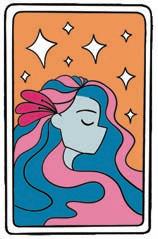

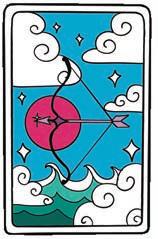



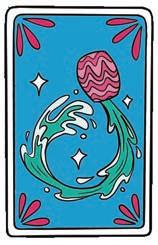
Plant to cultivate: The dead basil you’ve neglected for 3 months
TAURUS
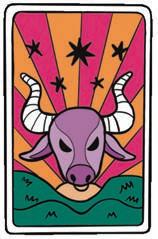
Apr 20 – May 20

Last week was rough. You may feel emotionally bruised and battered. However, a new week is upon you. It’s time to march forward, with a spring on your step, and more love in your heart.
Plant to cultivate: A healthy relationship.
LEO Jul 23 – Aug 22

This may come as a shock to you, but people can see right through your bullshit. It's time to put the ‘being real’ into your BeReal.
Plant to cultivate: The weeds in your drain.
SCORPIO Oct 23 – Nov 21
Going through a heartbreak? Angry at your passive aggressive flatmates? Now is the time to unleash. Normalize your insanity and inability to let things go.
Plant to cultivate: Venus fly trap.
Feb 19 – Mar 20
AQUARIUS PISCES ARIES
Pisces, your soul has felt lost recently. Try taking a trip to the beach to reconnect with your water sign roots. Or, drown your existential crisis in tequila. Whichever feels most natural to you. Either way, you're getting sloshed.
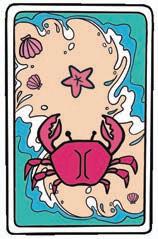
Plant to cultivate: Poppies.
GEMINI May 21 – Jun 20
You’re such a clown! Both in the way you manage to juggle so many things at once, and because you’re honestly pretty delusional sometimes.
Plant to cultivate: Golden pothos.
VIRGO Aug 23 – Sep 22
Being judgemental and opinionated is a tough gig, but somebody’s gotta do it. Never stop judging and nitpicking. It's in your Virgo spirit to do so.
Plant to cultivate: A bonsai tree.
SAGITTARIUS Nov 22 –Dec 21
There is a strong correlation between being a Sag, and a ‘pick me’ type of person. Try developing your own personality and sense of happiness. Stop searching for others, or you will remain a hollow individual.
Plant to cultivate: Radishes.
Mar 21 – Apr 19
Aries, your life does not need to be lived in constant conflict. Just because someone has a different opinion doesn’t mean they are stupid and wrong. This week, try to engage in diplomacy and kindness. Not everyone is against you.

Plant to cultivate: Peace lilies.
CANCER Jun 21 – Jul 22
You should try to leave your house sometime. There’s a whole wide world out there for you to explore. Stop rotting, start living. Also beware of accidentally stepping on your laptop.
Plant to cultivate: Coriander.
LIBRA

Sep 23 – Oct 22
Reality is made up. Truth is subjective. Being a hater is okay. Delusion is in, logic is out. Spend $30 on UberEats for no damn reason.
Plant to cultivate: The freaky little sneaky little fly on your Monstera.
CAPRICORN Dec 22 – Jan 19
It’s hard enough to enjoy the company of Capricorns, especially because they feel the incessant need to talk down to others. Your opinion isn’t always gospel, and you aren’t an expert in every field. Sometimes, you need to learn to shut the fuck up.
Plant to cultivate: Avocados.
RANGITAKI 06 COLUMNS
SNAP(S) OF

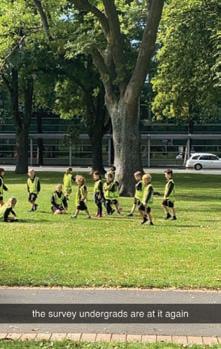


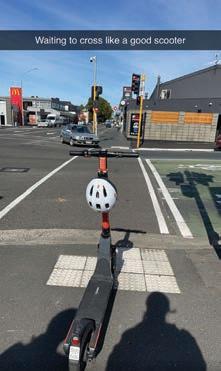
SNAP OF THE WEEK




SEND A SNAP TO US AT @CRITICMAG. BEST SNAP EACH WEEK WINS A 24 SLAB OF





46
THE WEEK CONTACT CRITIC ON FACEBOOK TO CLAIM YOUR REDBULL
SNAPS WERE POPPING OFF THIS WEEK, SO WE PICKED 4 WINNERS




SEXTET SEXYTET FEATURING SELWYN BALLET TICKETS ON SALE AT OUSA.FLICKET.CO.NZ UNIVERSITY OF OTAGO COLLEGE OF EDUCATION AUDITORIUM MAY 18TH - 20TH & 22ND - 24TH 7:30PM (DOORS OPEN 7:00PM) BAND COMEDY SKETCHES& MORE!


















 By Anna Robertshawe Staff Writer
By Anna Robertshawe Staff Writer
















 By Hugh Askerud
By Hugh Askerud





















 By Jamiema Lorimer
By Jamiema Lorimer
















































